Israel at War: What happened on day 15?
IDF says Hamas has at least 210 hostages.
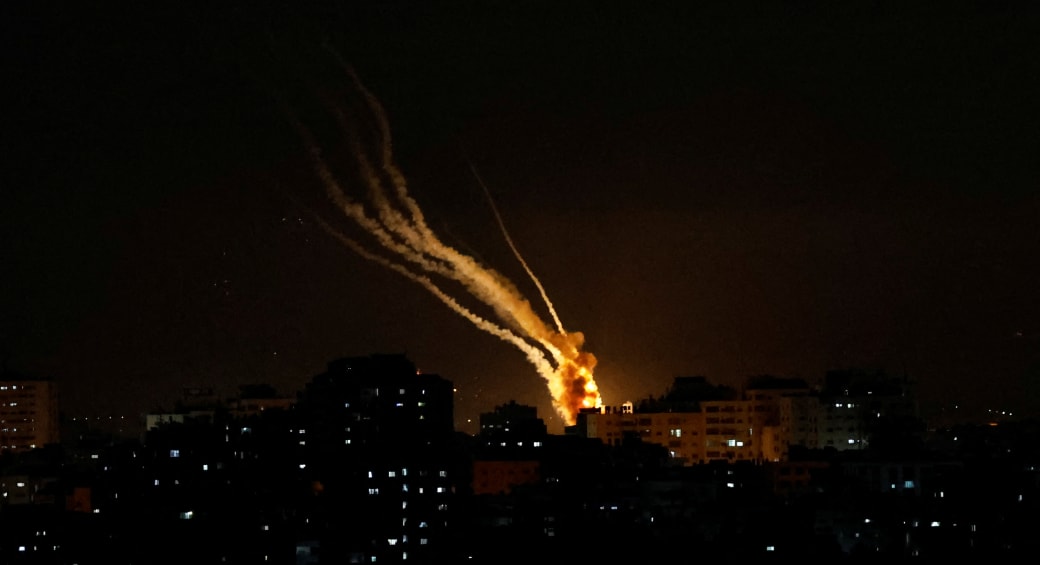

IDF Air Force Chief on invasion: I wouldn’t want to swap places with our enemy
One-fifth of Gaza rockets misfire, Hamas continues Tel Aviv, Gaza corridor; Arrests increase in West Bank.
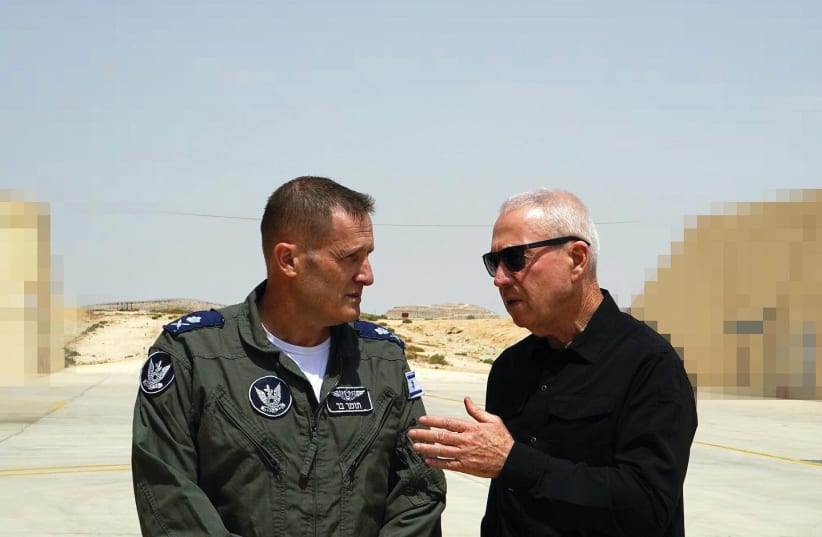
The air force chief said he “wouldn’t want to swap places with our enemy and face an IDF division or brigade,” as the army continued with its plans for an invasion of Gaza.
Maj.-Gen. Tomer Bar’s comments were made on Saturday during a briefing of squadron commanders in preparation for the invasion.
At the briefing, Bar also said the Israel Air Force has struck Hamas with thousands of missiles.
“We will come in with full force and strike them as if [it was] the first day of the battle,” Bar said. “Our role is to ‘embrace’ the land forces and say: ‘The enemy you are about to encounter met us before’” – meaning that the air force had worn down Hamas before the ground forces had to enter.
IDF Chief of Staff Herzi Halevi said, “Gaza is densely populated; the enemy has prepared a lot [for our invasion], but we are also preparing,” during a visit to Golani troops.
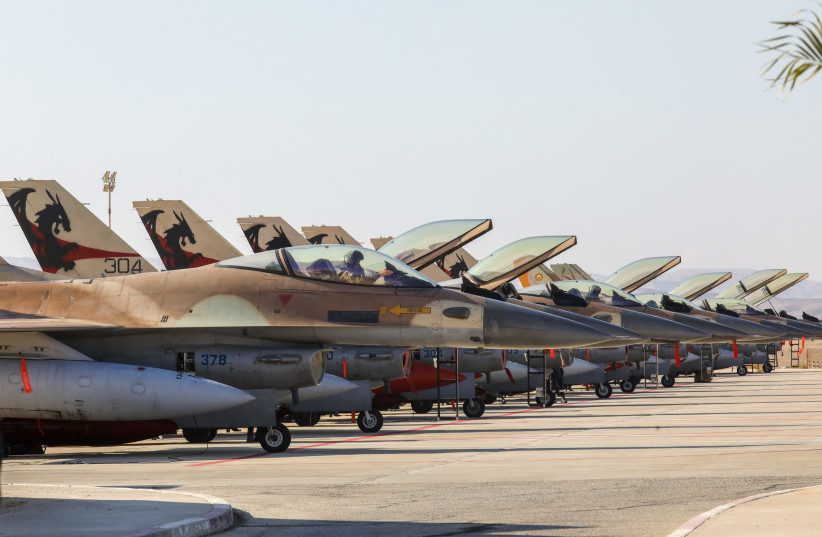 Israel Air Force drills with foreign forces in the ''Blue Drill'' exercise in October 2021. (credit: MARC ISRAEL SELLEM/THE JERUSALEM POST)
Israel Air Force drills with foreign forces in the ''Blue Drill'' exercise in October 2021. (credit: MARC ISRAEL SELLEM/THE JERUSALEM POST)Prime Minister Benjamin Netanyahu and his inner war cabinet, along with National Unity Party leader and war minister Benny Gantz, also met on Saturday. The content of the meeting is classified.
Earlier Saturday, IDF Spokesman Brig.-Gen. Daniel Hagari said one-fifth of the rockets fired by Hamas and Palestinian Islamic Jihad have misfired in the last day, landing inside Gaza and killing civilians.
Over the course of the conflict, 550 rockets have been misfired into Gaza by the terror groups. “They are killing their own people,” he said.
The announcement came only a few days after Hamas accused Israel of firing a rocket that struck Gaza’s Al-Ahli Arab Hospital, killing dozens of people. The accusation was quickly dispelled by the IDF and independent, international investigators who found the rocket emanated from a PIJ misfire.
Weekend rockets with few hits
Over the weekend, Hamas continued its rocket fire on Tel Aviv and the Gaza corridor, but with even less success in hitting Israelis or disturbing daily life as compared to many other days in recent weeks.
Hagari said, however, that Israel is continuing to attack Hamas military targets in the northern Gaza Strip in preparation for an imminent ground invasion. Israel planned to enter Gaza last week, but delayed due to a variety of factors, including evacuating civilians, US pressure on humanitarian issues, tactical concerns about Hezbollah’s intention, and traps that Hamas might be setting. He said 700,000 residents had already moved to the southern Gaza Strip.
Hagari also updated the number of soldiers killed and hostages taken. He said Israel had been in touch with the families of 307 fallen soldiers so far. He also raised the number of hostages to 210, noting that the country constantly gathers intelligence and informs families as soon as they know something new.
“That number will continue to change, and we will update you every time we tell a new family” that their loved one has been kidnapped.
On Thursday, Maj.-Gen. (res.) Nitzan Alon said a complex array of factors meant that the IDF had high certainty about a majority of its estimates, but that there were dozens or more cases that still required more examination of evidence, DNA testing, and other issues.
Some 765 civilians murdered by Hamas since the start of the war have so far been identified, the police said on Saturday.
The police, the IDF, and volunteers from ZAKA at the casualty identification station in Camp Shora have been working to identify the victims of Hamas’s massacre in the South for the past two weeks. They said the 765 victims who have been so far identified comprise approximately 75% of the Israeli civilians who were killed in the conflict.
Meanwhile, the IDF and the Shin Bet (Israel Security Agency) on Saturday arrested 89 wanted terrorists in Judea and Samaria overnight, including 68 members of the Hamas terrorist organization.
Among those arrested were prominent and close associates of Saleh al-Arouri, who, from outside the area, manages military-terrorist networks in the West Bank. These included al-Arouri’s brother and cousin – both members of Hamas – and Abraham Suleiman from Nablus, a prominent Hamas operative and former prisoner.
In addition, the IDF demolished the home of Hamas terrorist Maher Shalon, who carried out the Almog junction shooting attack in February, which killed Israeli-American Elan Ganeles.
During the operation, several suspects threw stones at the forces and fired explosives, prompting the troops to respond with fire. Injuries were reported.
In addition, the army and Shin Bet said forces located and confiscated materials used for manufacturing weapons in the village of Qusra.
Since the start of the conflict on October 7, there have been 670 wanted individuals arrested throughout the Judea and Samaria region, as well as in the Jordan Valley and the Bekaa region, with over 450 affiliated with Hamas, the army said.
Jerusalem Post Staff contributed to this report.
Go to the full article >>Inside the volunteer effort to preserve the harrowing testimonies of Israel’s Oct. 7 survivors
So far, the website has published 100 testimonies, and the number is growing by the day. Some survivors are submitting stories directly, and others first appeared in the Israeli press.
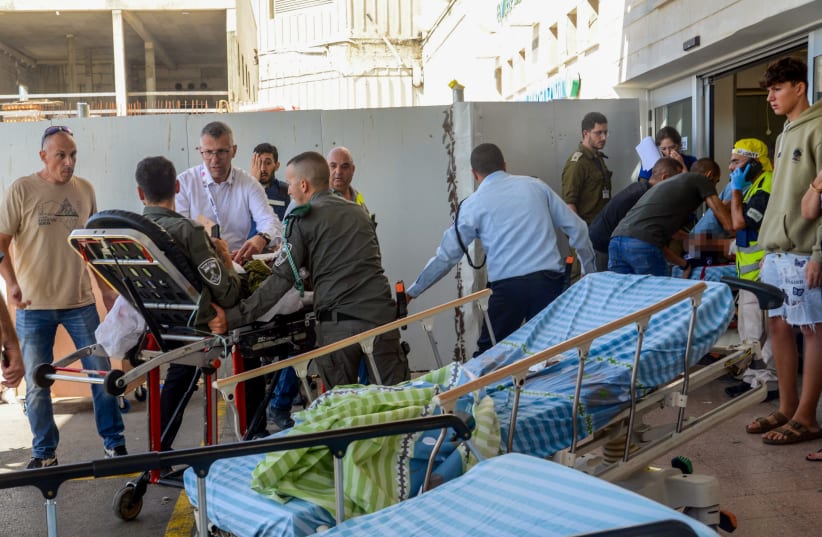
Two days after Hamas killed 1,400 of his fellow Israelis, Raz Elispur saw something on social media that broke through the fog of the crisis. It was a first-person account by May Hayat, written in Hebrew, that explained exactly how she had survived the massacre at the Nova dance party.
Hayat’s account described how the day began with a beautiful sunrise and ended with her fleeing Hamas captors who murdered a man in front of her, then covering herself in the blood of other victims to play dead until rescuers arrived hours later.
“It was the first time that we read content from someone, first person, with a face, with a name told from her perspective that tells everything and shares everything,” Elispur told the Jewish Telegraphic Agency.
Elispur, a video editor who lives in Tel Aviv, was inspired to take action. Working with his sister, Adi Clinton, he began reaching out to survivors within their own networks to offer to take down their stories. Soon, the project spiraled into something even more ambitious: a sweeping effort to collect survivor testimonies on a website whose name is simply the date of the devastating attack.
Telling the stories of survivors
“We built this website to make sure that the stories of survivors who endured these unimaginable horrors are never forgotten,” October7.org says. “It is our duty to ensure that the world bears witness to these atrocities.”

Elispur is often awake until 3 a.m. on Zoom calls with small groups of volunteers from around the world to coordinate the collection, translation, and publication of the stories, which include the first names and last initials of the survivors along with photos and videos from the time of the attacks.
In one story, a soldier describes the daylong ordeal that reduced her army unit to just seven survivors. In another, a man recounts how he and his running partners initially thought they had been saved by soldiers, only to see both of them murdered by Hamas terrorists. In a third, a woman describes escaping captivity, where her neighbor says she saw her baby daughter shot in the head, with the help of soldiers who fell around her. Many of the testimonies are from the nature party, where 260 bodies were recovered.
So far, the website has published 100 testimonies, and the number is growing by the day. Some survivors are submitting stories directly, and others first appeared in the Israeli press.
Elispur sees the enterprise as both a way to be useful at a time of communal service and to provide a direct benefit to survivors.
“For them, it’s also a way to just let it out, I would say,” Elispur said. “But for me, and also for my sister — I think for everyone that read it — when you read it, you can relate to it and you could imagine yourself in the same scenario, as horrible as it might sound.”
Given the number of casualties during the Hamas attack, Israeli media has been flooded with obituaries. Survivor testimonies play a different role. For one thing, they can for obvious reasons offer more details about the assault that Israeli civilians faced during the deadliest day for Jews since the Holocaust. They also can offer an antidote to denial and distortion in a climate of misinformation.
Survivor testimonies have been a crucial part of Holocaust education for decades, under the theory that hearing from people who lived through atrocities is a vital component of guarding against future genocides. Now, one organization that has been collecting Holocaust survivors’ testimony for the last three decades has announced that it is also taking testimony from Oct. 7 survivors.
“At such times, it is essential that we do not give ground to despair,” the University of Southern California Shoah Foundation said in a statement. “We have a duty to bear witness, to remember, and to act. We must learn from the experiences of those most affected, particularly the survivors of this deadly genocidal hatred.”
So far, everyone the October7.org team has reached out to for testimonies has agreed to have their story shared.
“People are thanking us and [saying], ‘Please spread it to the world, please do it,’” Elispur said.
To make the stories widely accessible, they need to be translated — and not by an automatic translation service, which can make errors and, crucially, lose the emotional tenor of the original. The October7.org team includes volunteer translators with knowledge of Japanese, English, German, Arabic, Spanish and French and is producing stories in each language.
While he says managing the website is tough, Elispur knows the translators have the toughest job because they read the stories so closely, watching as the narratives transition from descriptions of the “best party ever” to scenes of mass death.
“It’s super hard for them,” he said. “If I take responsibility for one person that reads more than two or three stories a day, I will feel guilty. I myself, when I post those stories, when I do the technical job, for me, it’s hard.”
The team repeatedly encourages each other to take breaks and spend time with their children in between translations. But the work, too, is a sort of salve in a time of great pain, Elispur said.
“Nothing we can do will bring back the 1,500 people that were murdered,” he said. “Nothing we can do will bring back my friend’s parents. But if you feel that you did a bit, it helps.”
Go to the full article >>WATCH: Fmr. Saudi official: There are no heroes in Israel-Hamas war, only victims
The former Saudi ambassador said that Hamas's attack on Israeli civilians "belies Hamas's claims to an Islamic identity."
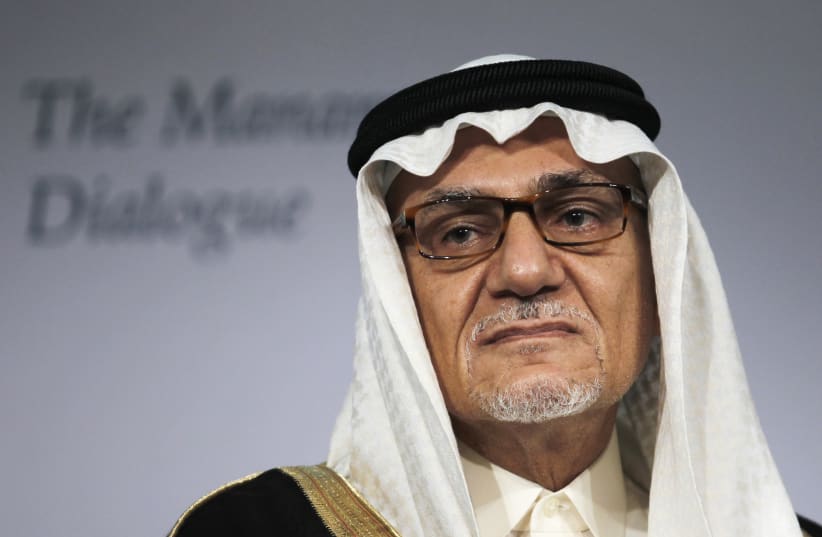
Former head of Saudi Arabia's General Intelligence Presidency and former Saudi ambassador to the US Turki al-Faisal condemned both Hamas and Israel in a speech on Tuesday, saying Hamas committed acts forbidden by Islam and Israel was 'indiscriminately' bombing civilians in Gaza.
"There are no heroes in this conflict, only victims," said Faisal in a speech at a conference hosted by Rice University's Baker Institute for Public Policy.
"All militarily occupied people have a right to resist their occupation, even militarily," said Faisal, stressing however "I do not support the military option in Palestine. I prefer the other option: civil insurrection and disobedience. It brought down the British Empire in India and the Soviet Empire in Eastern Europe."
"Israel has overwhelming military superiority and we see in front of our eyes the devastation and oblivion it is bringing to the people of Gaza."
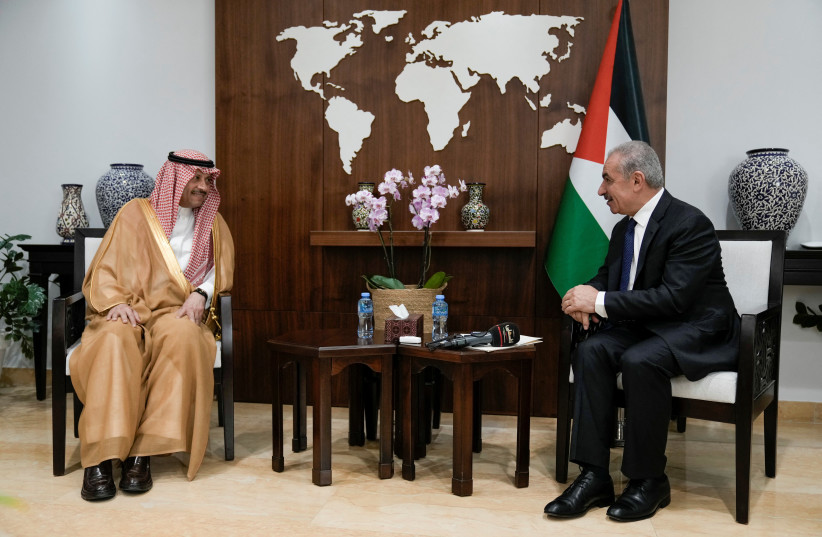
The former Saudi official condemned Hamas's assault on southern Israel, saying "I categorically condemn Hamas's targeting of civilian targets of any age or gender as it is accused of. Such targeting belies Hamas's claims to an Islamic identity. There is an Islamic injunction against the killing of innocent children, women, and elders. The injunction is also against the desecration of places of worship."
Faisal continued to condemn both Hamas and the Israeli government, saying "I also condemn Hamas's gifting the higher moral ground to an Israeli government that is universally shunned, even by half of the Israeli public, as fascist, miscreant, and abhorrent. I condemn Hamas for giving this awful government the excuse to ethnically cleanse Gaza of its citizens and bombing them to oblivion."
The former Saudi ambassador additionally referenced efforts to reach a peaceful solution to the Israeli-Palestinian conflict, seemingly as part of efforts to reach a normalization deal with Israel. "I condemn Hamas for further undermining the Palestinian Authority as Israel has been doing. I condemn Hamas for sabotaging the attempt of Saudi Arabia to reach a peaceful resolution to the plight of the Palestinian people, but equally I condemn Israel's indiscriminate bombing of Palestinian innocent civilians in Gaza and the attempt to forcibly drive them into [the] Sinai. I condemn Israeli targeted killing and the indiscriminate arrest of Palestinian children, women, and men in the West Bank. Two wrongs don't make a right."
Former Saudi official says Israel's actions concerning Palestinians 'provoked' Hamas attack
"I've been hearing a repeated phrase in American media: unprovoked attack. What more provocation is required to make it provoked than what Israel has done to the Palestinian people for three-quarters of a century."
Faisal listed off a number of complaints against Israel, including Jewish visits to the Temple Mount and settlements in the West Bank. The former Saudi ambassador additionally accused Israel of holding Palestinians "in concentration camps without recourse to due process."
Faisal referred to Qatar's role in the conflict between Israel and Hamas as well, saying "I condemn Israel for funneling Qatari money to Hamas, the terrorist group as defined by Israel."
Faisal stressed that the Arab Peace Initiative is "the only viable alternative to this bloodbath. Israel should seize it with all that it can muster of political, economic, and military might. Similar to America's Vietnam debacle, Israel just suffered its own 'Tet Offensive.'
The former ambassador compared the current war to the Vietnam War, saying that the US's losses in its involvement in the Vietnam War led to then president Lyndon B. Johnson not running for reelection. "Whether [Prime Minister Benjamin] Netanyahu will resign, we'll have to wait and see."
During the speech, Faisal also stated that the Yom Kippur War was "not an Arab attack on Israel, but an Arab counterattack to Israel's aggression in 1967." The former claimed that countless efforts were made to get Israel to withdraw to the 1948 borders before the war in 1973, including promising oil supplies to the US.
Faisal: I've never seen Netanyahu as a man of peace
In an interview with journalist Hadley Gamble, when asked if he believed peace could ever be achieved while Netanyahu is in office, Faisal responded "I have never seen him as a man of peace, so I don't know."
"He's had the most major defeat of his career as a result of Hamas's actions across the border with Gaza. Will he survive that, will the Israeli people allow him to survive that as prime minister and not bring him to task and question him and get rid of him because of this awful failure that resulted from his policy?"
Faisal added that Qatar's support of Hamas is "troubling."
"Hamas's activities against the Palestinian people [are] well documented, how they treated the Palestinian Authority when they took over in Gaza in 2006. As I said, I'm no friend of Hamas. Anyone who provides support to them should be taken to task.
Go to the full article >>Iran mobilizes proxies for drone war on US and Israel - analysis
Sanctions on Iran’s missile program ended this week, fueling Iran’s appetite for defense deals and empowering its sense of impunity regarding the supply of weapons to proxies.
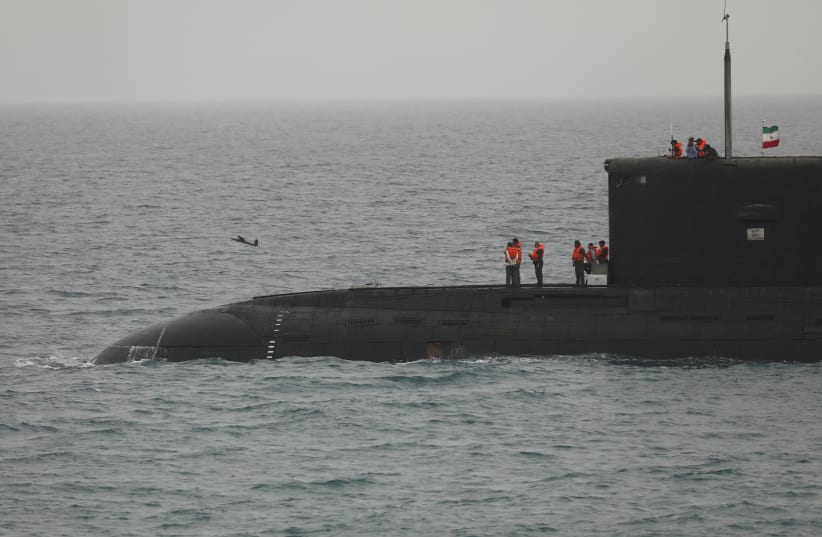
Iran has encouraged its terrorist proxy forces in Iraq, Yemen and Syria to begin a drone war against US forces and Israel. On Thursday drones and rockets targeted Ain al-Asad base in Iraq. This is at least the third attack on the bast this week. Iran operationalized the drones and rocket forces among its proxies this week and used false Hamas accusations that Israel struck a hospital as a catalyst to begin this planned campaign.
Iran has done this before. Pro-Iranian militias in Iraq began targeting US forces in 2019. They first used 107mm rockets that were likely of Iranian origin. They targeted numerous bases, eventually resulting in injuries and deaths. The US then struck Qasem Soleimani and Abu Mahdi al-Muhandis with a missile fired from a drone in January 2020 in response to all the attacks. Iran also carried out a drone and missile attack on Abqaiq in Saudi Arabia and used drones to target ships in the Gulf of Oman over the last two years. Iran also encouraged proxies in Syria to use rockets and drones to attack US forces near the Euphrates.
Rocket attack hits military base hosting US forces near Baghdad
Rockets have hit a military base hosting US forces near Baghdad's international airport, Iraqi police said on Thursday.
At least two Katyusha rockets landed in the perimeter of the base near a complex that houses US forces, police said.
Police said it was not clear if the attack caused any casualties.
Restarting an old war
Now Iran is beginning this drone war again. Reuters noted on Thursday that “drones and rockets targeted on Thursday evening the Ain al-Asad air base, which hosts US and other international forces in western Iraq, and multiple blasts were heard inside the base, two security sources said.” The Iraqi military claims it is searching for the drone debris. On Wednesday there were two drone attacks at Asad base, and one of them caused “minor injuries,” Reuters reported. The US intercepted the first drone attack, which reports said consisted of two drones. Iran and its proxies use kamikaze drones usually. Iran has exported Shahed 136 kamikaze drones to Russia. Sanctions on Iran’s missile program also ended this week, fueling Iran’s appetite for defense deals and empowering its sense of impunity regarding the supply of weapons to proxies.
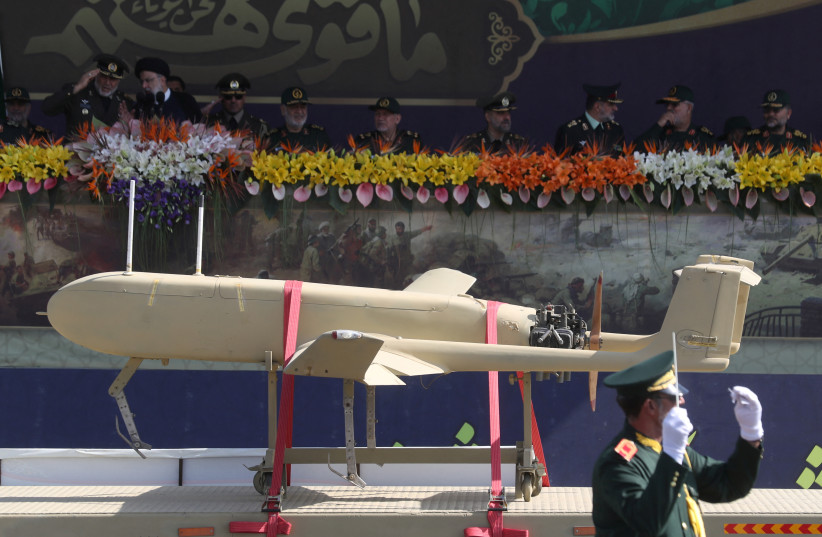
The Pentagon also said a US Navy warship had shot down three missiles and several drones that were launched from Yemen. Iran backs the Houthis in Yemen. In the past they have threatened Israel and the US. Their official slogan is “death to America, death to Israel, curse the Jews, victory to Islam.” Iran had reconciled with Saudi Arabia earlier this year and this was supposed to reduce threats from the Houthis. The Houthis tried to conquer Yemen in 2015 but Saudi Arabia and other Gulf states intervened. Iran shipped the Houthis technological know-how to make drones and ballistic missiles and Iran used Yemen as a testing ground for its kamikaze drones, perfecting targeting and precision.
The USS Carney, a Navy destroyer which is sailing in the Red Sea intercepted the drone and missile threat this week, according to Brig. Gen. Pat Ryder, Pentagon press secretary. The US says they were launched by the Houthis. “We cannot say for certain what these missiles and drones were targeting, but they were launched from Yemen heading north along the Red Sea, potentially towards targets in Israel,” Ryder said. They posed a potential threat and the US is prepared to support “our partners” in the region. This could refer to Israel. The US has sent two carriers to the Mediterranean amidst Hezbollah threats.
Iran’s drone wars now appear to be increasing across a wide swath of the Middle East. This is an arc of drone warfare that now stretches from Lebanon via Syria to Iraq and the Gulf and Red Sea. Iranian drones and the drones of its proxies are believed to have ranges of some 2,000km.
Go to the full article >>ISRAEL, HAMAS AT WAR: WHAT YOU NEED TO KNOW
- Hamas launched a barrage of rockets on October 7, with thousands of terrorists infiltrating from the Gaza border
- Over 1,400 Israelis and foreign nationals were murdered as of Thursday afternoon, and more than 4,600 were wounded according to the Health Ministry
- Israel reportedly preparing for a ground invasion of the Gaza Strip
- IDF: 203 families of Israeli captives in Gaza have been contacted